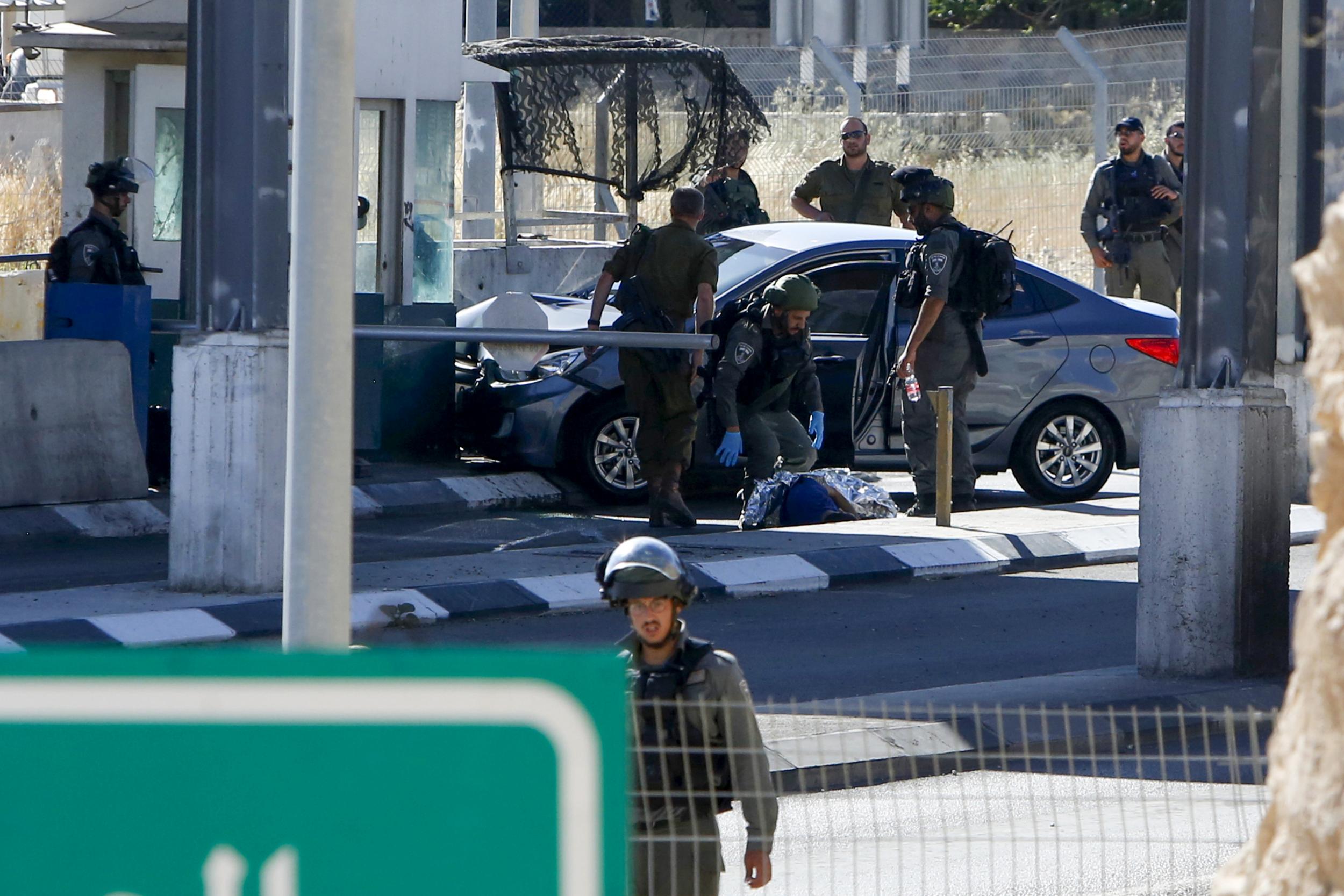Israeli forces kill relative of top Palestinian negotiator accused of ramming checkpoint
Family of Ahmad Erekat deny he meant to attack the police booth, saying he was en route to his sister’s wedding and lost control of the vehicle

Israeli security forces shot dead a relative of senior Palestinian official Saeb Erekat they said attacked a checkpoint, releasing CCTV footage showing the moment the man’s car hit the police booth.
The short video shows a silver Hyundai Accent approaching a small police hut near Abu Dis village in the occupied West Bank on Tuesday before speeding up, veering to the side and colliding with it, injuring a female officer. A moment later the Israeli officers shoot and kill Ahmad Moustafa Erekat, 27, as he exits the vehicle.
The family of Mr Erekat, who is a nephew of Palestinian chief negotiator Saeb Erekat, insists he lost control of the vehicle which he had hired to transport members of his family to his sister’s wedding later that day. The Palestinian authorities have urged the International Criminal Court to investigate what they called the “extrajudicial killing” of the man.
Mr Erekat’s relatives said he had no reason to try to harm Israeli security officers adding that he was on his way to collect his mother and sisters from a beauty salon in the West Bank town of Bethlehem ahead of the marriage ceremony that evening. He was preparing for his own nuptials a week later.
The video shows the vehicle slowly approaching the checkpoint before swerving and speeding up as it rams into a small booth, sending a female officer flying through the air. The man, whose face and body are blurred, immediately gets out of the car and takes a few steps before he is shot. It unclear if he had anything in his hands because the footage is pixelated.
A police statement said Mr Erekat waited for an opportune moment and “wildly plunged” the vehicle into the forces at the scene.
Micky Rosenfeld, a police spokesman, said the attack took place at Abu Dis security crossing and the border policewoman was struck, lightly injured, and later treated in hospital.
Hiba Erekat, the man’s cousin, said the family was baffled by the video.
“We know Ahmad. He had no reason to commit suicide. He was on good terms with his fiancée, his family and people in his town,” she said. “We are wondering if he had any personal problems and wanted to escape.”
Noura Erekat, another cousin and a human rights attorney, denied the video showed evidence of an attack, saying it made no sense. In a Twitter thread, she said he may have momentarily pressed the accelerator or lost control of the car, questioning why police killed him after he exited the vehicle.
Saeb Erekat, a senior Palestinian official and veteran peace negotiator, also cast doubt on the Israeli claims and urged an international investigation, saying the car was going too slowly to be an attack.
The Palestinian authorities called on the ICC to investigate the incident.
There has been a slew of car-ramming attacks, shooting and stabbings carried out in recent years mostly by lone Palestinian attackers with no apparent links to armed groups.
Israeli officers have frequently been accused of using excessive force, and in some cases of opening fire at cars that merely lost control. Human rights lawyers and Palestinians have also accused Israeli forces of using lethal force when their lives were not in danger and when they could have arrested suspects.
Late last month, Israeli police shot dead disabled Palestinian man Iyad Hallak outside Jerusalem’s Old City after mistaking him for an attacker as he was walking to his work at a special needs school.
His caregiver, who was with him at the time, maintains she told the police he was severely autistic and unable to communicate properly but they shot him anyway.
The shooting drew comparisons to the death of George Floyd in the US and prompted a series of small demonstrations against police violence towards Palestinians.
Join our commenting forum
Join thought-provoking conversations, follow other Independent readers and see their replies
Comments
Bookmark popover
Removed from bookmarks